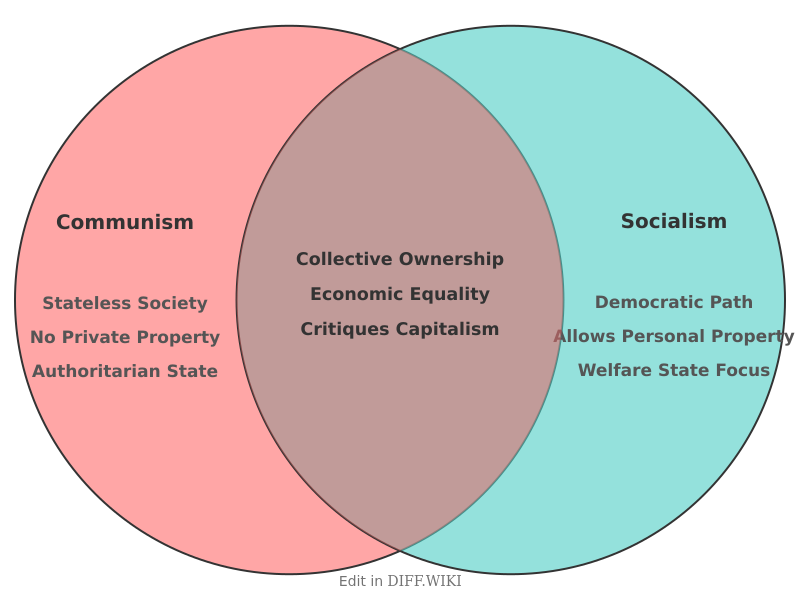Differences between Communism and Socialism
Contents
Communism vs. Socialism
Communism and socialism are economic and political ideologies that emerged in response to the inequalities of the Industrial Revolution.[1] While they share a common goal of creating a more equitable society, they differ in their approaches to achieving this goal. The terms are sometimes used interchangeably, even by historical figures like Karl Marx, leading to lasting confusion.[2]
In theory, both systems advocate for public ownership of the means of production, such as factories and natural resources, to replace the private ownership inherent in capitalism. The central government in both ideologies is largely responsible for economic planning.[1] However, the key distinctions lie in the extent of this ownership, the role of the state, and the method of distributing goods and services.
Comparison Table
| Category | Communism | Socialism |
|---|---|---|
| Core Philosophy | "From each according to his ability, to each according to his needs."[2] | "From each according to his ability, to each according to his contribution."[1] |
| Ownership of Means of Production | All means of production are publicly owned and controlled by the state.[1] | The state owns or controls major means of production, but private ownership of smaller enterprises may exist. |
| Private Property | Personal property is allowed, but private property (the means to produce capital) is abolished.[3] | Personal property is permitted, and individuals can own some forms of private property, though major industries are state-controlled.[4] |
| Political System | Typically a single-party state that claims to represent the working class.[5] | Can coexist with a range of political systems, including democratic ones. |
| Class Structure | Aims for a classless society where all are equal. | Aims to reduce class distinctions, but they may still exist to some extent. |
| Role of the State | In theory, the state is a temporary institution that will "wither away" once a classless society is achieved. | The state is seen as the primary means of administering production and providing social welfare. |
Ownership and Property
A primary distinction between communism and socialism lies in their views on property. In a communist system, there is a key difference between personal property (like clothing and a toothbrush) and private property (factories, mines, and land).[3] While personal property is allowed, private property is abolished and placed under state control.[3] The goal is to eliminate the concept of private ownership as the root of class divisions.
Socialism, on the other hand, generally allows for the ownership of personal property and may permit some private ownership of small businesses.[4] The focus is on the collective ownership and management of the major means of production and natural resources to ensure equitable distribution.
The Role of the State and Class
In Marxist theory, socialism is a transitional phase between capitalism and the final goal of communism.[2] During this socialist stage, the working class controls the state and the economy.[2] The state's role is to manage the economy, provide social welfare such as healthcare and education, and reduce economic inequality.
The ultimate aim of communism is to create a classless, stateless society. In this ideal society, the state would no longer be necessary and would "wither away" as people learn to administer their own affairs directly. This contrasts with many socialist models where the state remains the central administrative body. While socialism seeks to diminish the power of the capitalist class and enhance the position of the working class, it doesn't necessarily eliminate class distinctions entirely.
Individual Freedom and Incentives
Under socialism, individuals are compensated based on their contribution to the economy, which allows for individual effort and innovation to be rewarded.[1] This can create a degree of economic disparity, although significantly less than in a capitalist system.
In a purely communist society, the principle of "from each according to his ability, to each according to his needs" would apply.[2] In this system, individuals contribute what they can and receive what they need, regardless of their individual output. This model relies on a post-scarcity economy where there is an abundance of goods and services.
References
- ↑ 1.0 1.1 1.2 1.3 1.4 "thoughtco.com". Retrieved December 27, 2025.
- ↑ 2.0 2.1 2.2 2.3 2.4 "britannica.com". Retrieved December 27, 2025.
- ↑ 3.0 3.1 3.2 "britannica.com". Retrieved December 27, 2025.
- ↑ 4.0 4.1 "workers.org". Retrieved December 27, 2025.
- ↑ "quora.com". Retrieved December 27, 2025.
